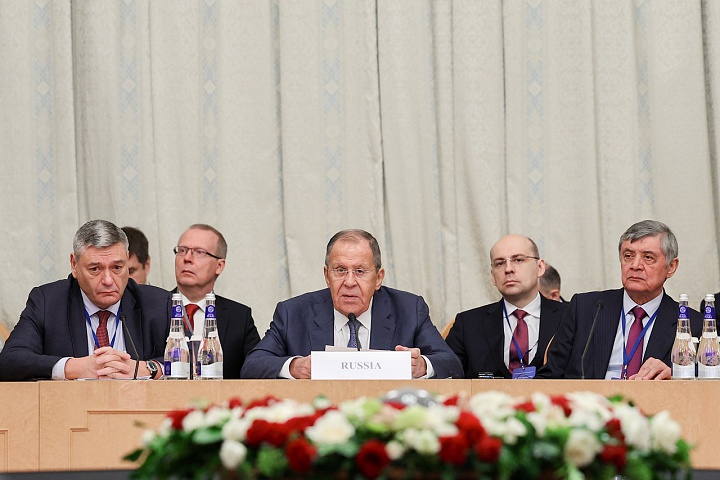Foreign Minister Sergey Lavrov’s opening remarks at the sixth meeting of the Moscow Format of Consultations on Afghanistan, Moscow, October 4, 2024
Colleagues,
Friends,
I am delighted to welcome you to the capital of Russia for the sixth meeting of the Moscow Format of Consultations on Afghanistan.
I am especially pleased to welcome Foreign Minister of Afghanistan Mawlawi Amir Khan Muttaqi, who is attending this event as the guest of honour. It is obvious that it is impossible to settle Afghanistan’s problems or even discuss them without the country’s representatives.
The importance of the Moscow dialogue platform continues to grow. We are grateful to you for paying so much attention to its work. This format is based on the principle of equality and consensus and is therefore conducive to the practical coordination of the approaches of Afghanistan’s neighbours and other regional countries concerned in developing relations with Kabul.
We firmly believe in the importance of maintaining a pragmatic dialogue with the current Afghan government. Constructive interaction with our Afghan partners serves the interests of the region’s security and economic development, as well as the goals of intra-Afghan national accord.
It is clear, and nobody needs to be persuaded of this, that the cynical policy of the collective West is pushing the situation in Afghanistan into a dead-end. While proclaiming their commitment to international support for the Afghans, Washington and its allies are hindering the revival of the Afghan state. The United States disregards international criticism of its actions and continues to illegally hold Afghanistan’s national assets while maintaining strict sanctions against its banking sector. We again urge Western countries to accept responsibility for the post-conflict reconstruction of Afghanistan, lift their restrictions and release Kabul’s assets.
In the context of discussions underway in the West, we would like to once again emphasise the unacceptability of returning the military infrastructure of third countries to Afghanistan or deploying military facilities in neighbouring countries under any pretext. History shows that projecting external force in that region can only compound the region’s problems.
The Kabul authorities are taking substantial efforts against drug trafficking. According to the UN Office on Drugs and Crime, poppy cultivation has dropped by around 95 percent – from 233,000 hectares at the end of 2022 to 10,800 in 2023, and opium production saw a similar, almost 20-fold decline from 6,200 tonnes to 333 tonnes. We have just now talked with Minister Muttaqi about the importance of continuing this work.
We support the Afghan authorities’ resolve to combat the terrorist threat. It is especially important that they are effectively fighting ISIS and its periodic incursions into Afghan territory despite the difficult economic situation. But it is obvious that Kabul still faces a large number of pending tasks in the sphere of counterterrorism. Various terrorist groups make incursions into Afghanistan’s territory from abroad. It is in our common interests to provide the necessary and effective assistance to the Afghan authorities in this sphere.
The socioeconomic situation in Afghanistan remains critical. According to the UN, over 23 million people, including 12 million children, are in need of humanitarian assistance. We believe that international humanitarian assistance to Afghanistan should be increased and must not be politicised. For our part, we will continue to make regular deliveries of food and basic necessities to Afghanistan.
Moscow will continue to develop political, trade and economic ties with Kabul. In this context, I would like to emphasise the intensive exchange of delegations between our countries. This year, Afghan delegations attended respected international events such as the St Petersburg International Economic Forum, the Eastern Economic Forum, the international economic forum Russia – Islamic World: Kazan Forum, the St Petersburg International United Cultures Forum and the recent Russian Energy Week.
In conclusion, I would like to reaffirm our commitment to assisting the settlement of Afghanistan’s still numerous problems by developing the Moscow format and the mechanism for meetings of neighbouring countries. We are confident that it is the regional platforms that can attain the best results possible by combining their efforts.
In this connection, we call for caution regarding the United States and its allies’ efforts to force their way into the settlement process with the aim of assuming control, in particular, by using the UN’s prestige for their reprehensible purposes. I wish all of you success.


